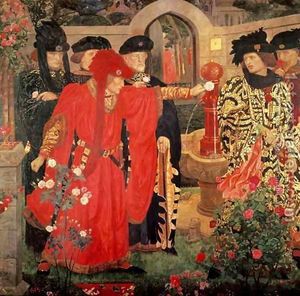I’m loving Dan Jones’s new Channel 5 series on the Wars of the Roses. It’s so refreshing to see a TV show which is both engaging and well researched. He’s a good presenter and having read ‘The Hallow Crown’ some months ago, I can confirm that he’s also a very convincing historian and compelling writer.
But I do have one bone to pick with him. Although not laboured in the excellent two episodes I’ve seen so far, in both his book and other articles, Jones has been quick to label the Wars of the Roses as a ‘Tudor construction.’
Don’t get me wrong. He’s not saying that the battles didn’t happen or that the crown didn’t endlessly change hands. He’s trying to make the point that the framing of it as a dynastic struggle, York vs Lancaster, or red rose vs white, was whipped up by the Tudors in order to present themselves as the ultimate reconcilers of the conflict through the marriage of Henry VII and Elizabeth of York.
To an extent I agree with him. The early stages were about the Duke of York trying to replace the ministers of the Lancastrian King; he probably was genuinely loyal to the monarch himself at the start. But, I still struggle to endorse the theory that it has come down to us as a dynastic struggle solely because that’s the way the Tudors wanted to spin it. Here’s a few #QuickFireThoughts from me:
- The Duke of York, the main antagonist in the conflict, was motivated in part by the fact that, because of his Royal blood, he felt he should be playing a greater role in government.
- The main wielder of power (after the Queen) was the Duke of Somerset, a Beaufort descendant of John of Gaunt, Duke of Lancaster. He was appointed more because of his Lancastrian blood than any great ability.
- York’s main beef was with Somerset. Therefore, even at the earliest stage, there was an element of York vs Lancaster. Dynastic loyalty meant something, even at the beginning.
- York’s closest supporter, the Earl of Warwick, was a member of his family and the fiercest defenders of the status quo, Beauforts and Tudors, were close in blood to the King.
So to cut a long story short, I think dynastic loyalty and the question of power by right of blood were always facets in what contemporaries called ‘the cousins’ war.’ I get that Dan Jones knows a lot more than me, I’m just increasingly fed up with so much stuff getting written off as ‘Tudor propaganda’ when I’m not entirely sure there’s much evidence for it.
So geeks…what do you think? Did the Tudors re-write history? Did Dan Jones got a little carried away? Do I have a clue what I’m talking about? I want to know what YOU think!
